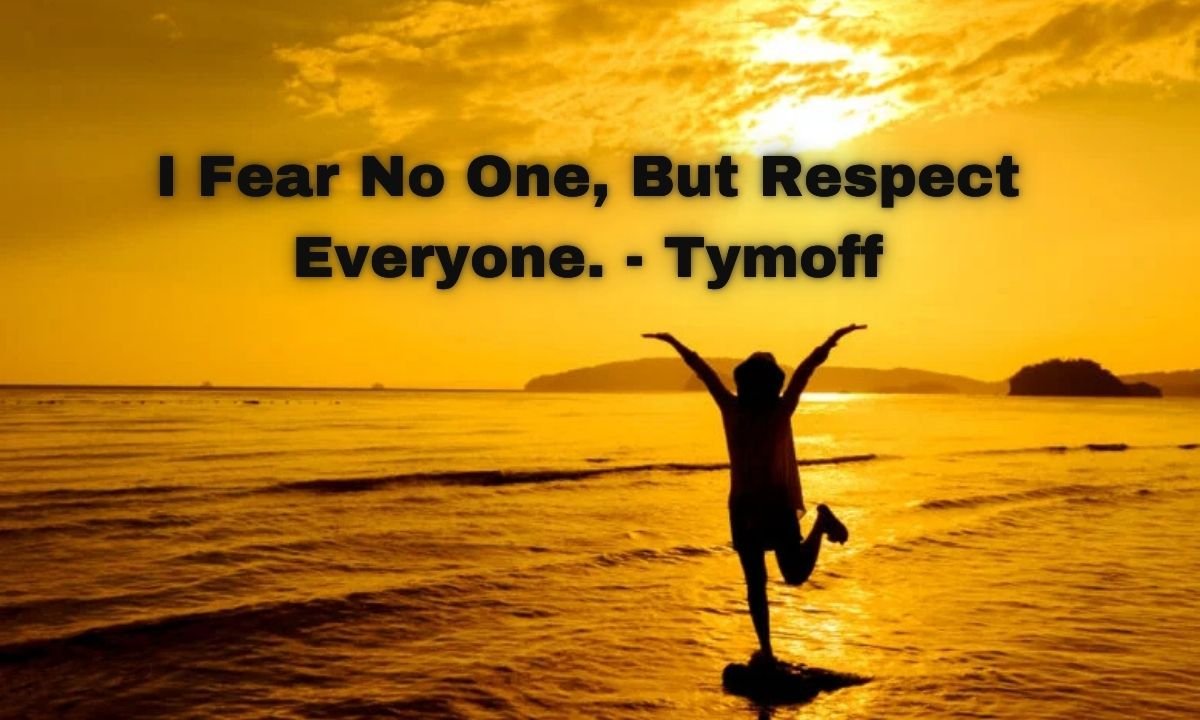Introduction
In today’s high-stakes business environment, the most successful leaders don’t just command—they inspire. They lead with clarity, strength, and a rare balance of emotional intelligence. The phrase “I fear no one, but respect everyone” by Tymoff perfectly captures this balance. It reflects a leadership philosophy grounded in unshakable confidence and unwavering respect—two traits essential for achieving long-term success in both business and life.
This blog breaks down the core meaning of the quote, explains its powerful implications for modern professionals, answers common questions, and shows how to adopt this mindset for real-world impact.
The Power Behind the Quote: What Does It Really Mean?
At first glance, Tymoff’s quote may appear paradoxical. But when examined closely, it offers a masterclass in leadership psychology.
“I Fear No One” = Inner Strength
This phrase represents fearless decision-making, the ability to stand your ground under pressure, and the confidence to lead in uncertain conditions. Fear often leads to hesitation, people-pleasing, or inaction—all career killers in fast-moving industries.
“But Respect Everyone” = Emotional Intelligence
Respect isn’t submission; it’s a strategic strength. It builds trust, facilitates better communication, and sets the tone for inclusive leadership. Leaders who show respect earn it in return.
Together, this mindset says: “I won’t be intimidated by titles or threats, but I will treat everyone—regardless of status—with dignity.” That’s leadership maturity.
Why This Mindset Matters More Than Ever
1. Confidence Is a Career Accelerator
According to a 2024 LinkedIn Workplace Report, 71% of professionals say confidence impacts how they’re perceived by peers and leadership. Being fearless enables:
-
Faster decision-making
-
Better crisis management
-
Increased visibility in meetings and negotiations
2. Respect Builds Culture and Retention
A Gallup survey revealed that employees who feel respected are 63% more likely to stay with their organization. Respect:
-
Promotes trust
-
Enhances team collaboration
-
Reduces workplace conflict
3. The Future Demands Balanced Leaders
The World Economic Forum’s 2025 Skills Outlook lists emotional intelligence and resilience among the top skills leaders need. Tymoff’s quote embodies both.
FAQs: “I Fear No One, But Respect Everyone” by Tymoff
Q1: Is this mindset realistic in a cutthroat industry?
Yes—especially in competitive environments. Fearlessness gives you an edge; respect makes you sustainable. Fear-driven leadership leads to burnout and attrition. Balanced leaders last longer and lead better.
Q2: Isn’t this quote just another cliché?
No. This quote has deep, practical implications. It encourages:
-
Assertiveness without aggression
-
Diplomacy without weakness
-
Confidence without ego
Q3: Can introverts practice this mindset?
Absolutely. Fearlessness doesn’t mean loud. Introverts often excel at calm composure and measured confidence, which is ideal for respectful leadership.
Q4: How can I start embodying this quote in daily work?
-
Challenge assumptions with confidence
-
Speak up in meetings without fear of judgment
-
Treat every team member with the same level of courtesy
-
Replace fear of authority with data-driven dialogue
Actionable Ways to Adopt Tymoff’s Philosophy
1. Speak with Conviction, Not Hesitation
Replace vague words like “maybe” or “just” with direct communication. Strong communicators exude respect and decisiveness.
2. Recognize Everyone’s Value
Respect isn’t reserved for executives. Great leaders greet janitors and board members with equal regard. This small habit transforms workplace morale.
3. Use Confident Body Language
Posture matters. Eye contact, firm tone, and an open stance signal self-assurance—without intimidation.
4. Challenge Without Undermining
Disagreeing is natural. The key is to do it constructively. Say, “Let me offer a different perspective,” instead of, “You’re wrong.”
5. Train Your Mind to See Growth, Not Threats
Instead of fearing rejection, reframe tough moments as learning opportunities. That mindset fuels both resilience and humility.
Real-Life Examples: Leaders Who Live This Philosophy
Satya Nadella (CEO, Microsoft)
He turned Microsoft into a culture of collaboration by leading with empathy and courage, empowering employees while driving innovation.
Indra Nooyi (Former CEO, PepsiCo)
Known for her directness and deep respect for her team, Nooyi embodied confident leadership that valued every stakeholder.
Nelson Mandela
While political, Mandela’s legacy proves this mindset works: he stood firm against injustice without dehumanizing his opponents—a global example of fearless, respectful leadership.
The Business Case for a Fearless, Respectful Mindset
48% Increase in Team Productivity
According to Forbes, emotionally intelligent leaders see nearly 50% boosts in team productivity.
3x Increase in Innovation
Google’s Project Aristotle found that psychological safety—driven by respect—tripled innovation output.
70% of Hiring Managers Prioritize Confidence
Data from Robert Half shows that confidence, paired with professionalism, ranks above even technical skills in hiring decisions.
Conclusion
Tymoff’s quote, “I fear no one, but respect everyone,” is more than an inspirational soundbite—it’s a proven leadership strategy for the future of work. It tells professionals to be firm, but fair; brave, but kind; strong, but never superior.
In 2025 and beyond, the world doesn’t just need more leaders—it needs better ones. Leaders who inspire without instilling fear and who elevate others while standing their ground.
Start practicing this mindset today, and you’ll not only command more respect—you’ll become the kind of leader people choose to follow.

